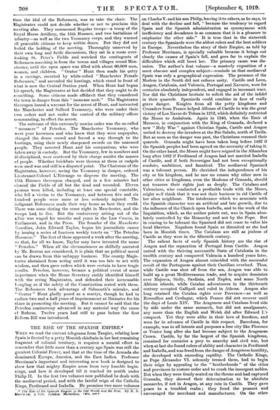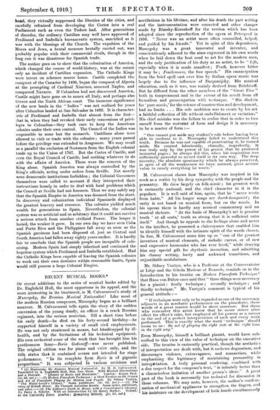THE RISE OF THE SPANISH EMPIRE.*
WHEN we read the current telegrams from Tangier, relating how Spain is flouted by a petty Moorish chieftain in her last remaining fragment of colonial territory, it requires a mental effort to remember that little more than a century ago Spain was still the greatest Colonial Power, and that at the time of the Armada she dominated Europe, America, and the East Indies. Professor Merriman's important and interesting new book is designed to chow how that mighty Empire arose from very humble begin- nings, and how it developed till it reached its zenith under Philip II. In the first two voluthes now published he deals with the mediaeval period, and with the fateful reign of the Catholic Kings, Ferdinand and Isabella. He promises two more volumes • The Rise of the Scanish .S.'w_pire in the Old World and the New. By B. B. Iderrirran, 2 Tele. London Macmillan, 140s. no►w
on Charles V. and his son Philip, leaving it to others, as he says, to deal with the decline and fall, " because the tendency to regard Spain and the Spanish administration as synonymous with inefficiency and decadence is so common that it is a pleasure to emphasize the other side." It is true that in the sixteenth century the Spaniards were the ablest rulers and the best soldiers in Europe. Nevertheless the story of their Empire, as told by Professor Merriman, is specially valuable because it brings out clearly the causes of Spain's fall, and goes far to explain the difficulties which still beset her. The primary cause. was dis- union. The author's first volume—a masterly exposition of a most obscure and complex subject—reminds us that mediaeval Spain was only a geographical expression. The presence of the Moslem in the South did not enforce unity. Castile and Leon, Aragon, Catalonia, and Valencia, Portugal and Navarre, were for centuries absolutely independent, and engaged in incessant wars. Nor did the Christians hesitate to solicit the aid of the infidel in their quarrels. Spaniards could combine in face of really grave danger. Knights from all the petty kingdoms and Crusaders from France helped Alfonso of Castile to win the great victory of Las Navas de Tolosa in 1212, which definitely restricted the Moors to Andalusia. Again in 1340, when the Emir of Morocco, in conjunction with the King of Granada, declared a new " Holy War " against Christian Spain, Castile and Aragon united to destroy the invaders at the Rio Salado, north of Tarifa. But as soon as the danger was past, the Christians resumed their quarrels. Granada might have been taken long before 1492 if the Spanish peoples had been agreed on the necessity of taking it. On the other hand, the Moors might have reigned in the Alhambra long after 1492 if Ferdinand of Aragon had not married Isabella of Castile, and if both Sovereigns had not been exceptionally resolute, ambitious, and fanatical. The mediaeval Spaniard was a tolerant person. He cherished the independence of his city or his kingdom, and he saw no reason why other men in other cities or kingdoms, even the Moslems of Granada, should not treasure their rights just as deeply. The Catalans and Valencians, who conducted a profitable trade with the Moors, might well think that it was not their business to rid Castile of her alien neighbour. The intolerance which we associate with the Spanish character was an artificial and late growth, due to the influence of the Church upon Isabella, and to the work of the Inquisition, which, as the author points out, was in Spain abso- lutely controlled by the Monarchy and not by the Pope. But in ceasing to be tolerant the Spaniard did not cease to value his local liberties. Napoleon found Spain as disunited as she had been in Moorish times. The Catalans are still as jealous of Castile as they were in the fifteenth century.
The salient facts of early Spanish history are the rise of Aragon and the separation of Portugal from Castile. Aragon united with the thriving mercantile State of Catalonia in the twelfth century and conquered Valencia a hundred years later. The expansion of Aragon almost coincided with the successful revolt of the Portuguese against their Castilian overlord. Thus, while Castile was shut off from the sea, Aragon was able to build up a great Mediterranean trade, and to acquire dominion over Majorca, Sicily, Sardinia, and Naples, and some North African islands, while Catalan adventurers in the thirteenth century occupied Gallipoli and ruled in Athens. Aragon also long retained the Catalan rights over Provence—as well as Roussillon and Cerdagne, which France did not recover until the days of Louis XIV. The Aragonese and Catalans lived side by side under the same monarch, but did not amalgamate, any more than the English and Welsh did after Edward I.'s conquest. Yet they were alike in their love of freedom, and were far in advance of Castile in this respect. Barcelona, for example, was to all intents and purposes a free city like Florence or Venice long after she had become subject to the Aragonese Crown. Castile, by far the largest of the Spanish kingdoms, remained for centuries a prey to anarchy and civil war, but when at last she found rulers of ability and character in Ferdinand and Isabella, and was freed from the danger of Aragonese hostility, she developed with exceeding rapidity. The Catholic Kings, as Pope Alexander VI. solemnly termed them, had to begin their reign by appealing to the " brotherhoods " of the cities and provinces to restore order and to crush the insurgent nobles. But when they were firmly seated on the throne and had captured Granada, they showed their determination to be absolute monarchs, if not in Aragon, at any rate in Castile. They gave peace to a troubled realm ; they freed the peasant and encouraged the merchant and manufacturer. On the other hand, they virtually suppressed the liberties of the cities, and carefully refrained from developing the Cortes into a real Parliament such as even the Tudors had. After generations of disorder, the ordinary Castilian may well have approved of Ferdinand and Isabella's bureaucratic system, sanctified as it was with the blessings of the Church. The expulsion of the Moors and Jews, a brutal measure brutally carried out, was probably popular with their commercial rivals, though in the long run it was disastrous for Spanish trade.
The author goes on to show that the colonization of America, which changed the course of world-history, was at the outset only an incident of Castilian expansion. The Catholic Kings were intent on schemes nearer home. Castile completed the conquest of the Canaries by 1496, began the conquest of Algeria at the prompting of Cardinal Ximenes, annexed Naples, and conquered Navarre. If Columbus had not discovered America, Castile might have gone on to annex all Italy, and perhaps also Greece and the North African coast. The immense significance of the new lands in the " Indies " was not realized for years after Columbus landed at San Salvador in 1492. It is character- :stic of Ferdinand and Isabella that almost from the first— that is, when they had revoked their early concessions of privi- leges to Columbus—they took care to keep the American colonies under their own control. The Council of the Indies was responsible to none but the monarch. Castilians alone were allowed to visit or trade with the colonies ; many years passed before the privilege was extended to Aragonese. We may recall as a parallel the exclusion of Scotsmen from the English colonial trade up to the Union of 1707. But the Cortes of Castile, and even the Royal Council of Castile, had nothing whatever to do with the affairs of America. These were the concern of the King alone. Spanish America was always controlled by the King's officials, acting under orders from Seville. Not merely were democratic institutions forbidden ; the Colonial Governors themselves were called to account if they interpreted their instructions loosely in order to deal with local problems which the Council at Seville had not foreseen. Thus we may safely say that the Spanish Empire in America was doomed from the start. In discovery and colonization individual Spaniards displayed the greatest bravery and resource. The colonies yielded much wealth for generations to Spain. Nevertheless, the colonial system was so artificial and so arbitrary that it could not survive a serious attack from another civilized Power. The longer it lasted, the weaker it grew. In our own day we have seen Cuba and Porto Rico and the Philippines fall away as soon as the Spanish garrisons had been disposed of, just as Central and South America had fallen away eighty years earlier. It is hardly fair to conclude that the Spanish people are incapable of colo- nizing. Modern Spain had simply inherited and continued the hopeless system which Ferdinand and Isabella established. Had the Catholic Kings been capable of leaving the Spanish colonies to work out their own destinies within reasonable limits, Spain would still possess a large Colonial Empire.



































 Previous page
Previous page